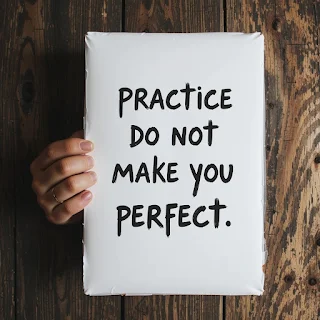The cooking corrundum
Imagine a young man moving away from his home for college. He never cooked before. Now due to necessity, he start cooking. At first, it's a disaster burnt rice, uncooked chicken, and over salted soups. But as the months turn year, he starts cooking every day. After 5 years is he a master chef?
No.
His cooking skills have improved, but he is still average. He is not able to make certain dishes, and sometimes, he messes with the basics.
Why? he has been cooking for years. He should achieve mastery at cooking.
This is where the common saying practice makes a man perfect falls apart. The truth is practice alone never guarantees mastery. Unless you do the right thing practice the right way.
The Myth of Endless Repetition
Let's take another example of driving. Most people drive every day. Some people drive every day for 10 years or more, yet struggle with parallel parking, reaction times, or smooth turns. If practice alone can make people better then Wouldn't every driver be as skilled as a racecar pro?
The problem is mindless repetition. Doing the same thing again and again without trying to improve doesn't make you an expert. You just enforce the existing habit good or bad.
Think of it like this if you've been swinging the golf club for 10 years in the wrong way. Guess what? you've perfected the wrong swing. This is why years of practice don't make you expert unless you practice deliberately.
The Power of Deliberate Practice
so what separates expert from the rest? Deliberate practice
Psychologist Anders Ericsson, who studied world-class performers found that mastery does not come just from practice but practicing with purpose.
there are 3 key elements of deliberate practice.
- Focus on weakness - Instead of repeating what you already know, you have to focus on weak spots and work on them.
- Immediate feedback - Without feedback, you don't know what to improve that's why mentors and coaches are important
- Pushing your comfort zone - Improvement comes when you challenge yourself not just going through the motions.
Example: The violinist who changes everything
Ericsson once studied violist at a music academy. The best violinists do not just practice they practice differently
Instead of paying for the piece they are already good at, they focus on the most difficult passage.
Instead of practicing mindlessly for an hour, they practice with deep concentration for shorter periods.
They actively sought critique and feedback instead of repeating the same mistake again and again.
This approach deliberately focused, and goal-oriented practice makes them exceptional.
How to Make Your Practice More Effective
How can you apply this to your skills? whether that is cooking, coding, music, or even in business.
Step 1: Work on your weak points
Instead of just repeating what you already descend at, focus on problem areas. If you are a writer not only focus on writing but also improve essential aspects of writing like storytelling, hooks, seo.
Step 2: Track progress and set goals
Vague practice leads to vague results. Instead, set clear achievable goals and achieve them. If you're learning a new language just commit to yourself you'll learn 10 new words and use them during conversation.
Step 3: Get expert feedback
Even the best experts have their coaches. If you want to improve then seek guidance from a coach, or trainer or you can ask for help in online communities where they will critique your work.
Step 4: Push beyond comfort
Growth happens when you're slightly uncomfortable. If you are a public speaker don't just practice alone get a stage, join a public speaking club.
Common Mistakes That Keep You Stuck
Even if you practice, certain mistakes can hold you back.
1. Practicing without feedback: If no one points out your mistake how can you improve?
2. Doing the same thing without adjustment: Repeating mistakes does not fix them, correcting does.
3. Avoiding discomfort: If practicing feels too easy, you're not growing.
4. Not setting clear goals: Getting better is not a good strategy, clear measurable progress is.
Conclusion: Practice smarter, not just harder
The truth is years of practice do not make you an expert unless you practice with strategy, purpose, and feedback.
If you want to best at things, don't just do it, do it better. Challenge yourself, analyze mistakes, seek feedback, and push your limits
So, next time someone tells you, that practice makes perfect then tell them
Only if you practice the right way.




.png)
0 Comments